Speakers
9th European Beer and Health SymposiumDr. Rosa Lamuela-Raventós

Dr. Rosa Lamuela-Raventós
Dr. Rosa M Lamuela-Raventós has a Ph.D. in Pharmacy.
She is the Director of the Institute for Research on Nutrition and Food Safety (INSA-UB) since December 2015 and an Associate Professor at the Department of Nutrition, Food Sciences and Gastronomy of the School of Pharmacy and Food Sciences, University of Barcelona.
She is among the most influential scientists in the world according to the Highly Cited Researchers list published by Clarivate Analytics in 2017 and 2018. She has published 294 articles and her h-index is 76.
She has been awarded the XXV Premio Instituto Danone a la Trayectoria Científica “Dr.Carles Martí Henneberg in December 2018.
Dr. Lamuela-Raventós is the principal investigator of the research group “Natural Antioxidants: Polyphenols” and leads one of CIBEROBN’s investigation groups.
She is involved in important national and international projects related to the nutritional interest of bioactive compounds in foods.
Abstract
Effects of moderate beer consumption on osteoporosis in postmenopausal women
Rosa M Lamuela-Raventós(1,2), Marta Trius(1,2), Carolina Emilia Storniolo(1,2), Ramon Estruh(2,3) and Anna Tresserra-Rimbau(2,4)
(1) Department of Nutrition, Food Science and Gastronomy, XaRTA, INSA, School of Pharmacy and Food Sciences, University of Barcelona, Barcelona, Spain
(2) CIBER Fisiopatología de la Obesidad y Nutrición (CIBEROBN), Instituto de Salud Carlos III, Madrid, España
(3) Department of Internal Medicine Institut d’Investigacions Biomèdiques August Pi Sunyer (IDIBAPS), Hospital Clinic, University of Barcelona, 08036 Barcelona, Spain;
(4)Universitat Rovira i Virgili, Departament de Bioquímica i Biotecnologia, Unitat de Nutrició Humana. Hospital Universitari Sant Joan de Reus, Institut d’Investigació Pere Virgili (IISPV). Reus, Spain.
Hormone replacement therapy effectively reduces the symptoms associated with decreased estrogen levels, however, frequently the benefits of this therapy do not outweigh the risks. Therefore, natural alternatives are sought to alleviate these symptoms such as phytoestrogens (Chen, M.-N. et al., (2015); Kurzer, M. S., (2018)). Epidemiological studies in Asian populations, where the consumption of soy and other phytoestrogen-rich foods is high, have reported lower incidence of breast cancer, osteoporosis, heart disease and strokes than in the Western populations. Comparing to hormone treatments, these diets have the advantage of not having side effects, mainly thromboembolism or breast cancer (Abdi, F. et al., (2016); Keiler, A. et al., (2013)). Phytoestrogens are non-steroidal plant-derived estrogens, structurally or functionally similar to endogenous estradiol and therefore with estrogen-like properties. They are polyphenolic compounds, which have a chemical structure with an aromatic ring attached to one or more hydroxyl groups, similar to estrogens. Polyphenols are the most abundant antioxidants in the diet, since they are widely distributed in nature and present in plant-based foods, while in the animal kingdom or in humans their presence is due to the ingestion of plant foods and they are only found in relatively low concentrations. Phytoestrogens include a wide variety of structurally different compounds, such as isoflavones, mainly found in soybeans; lignans, found in grains and extra virgin olive oil; stilbenes, found in grape skins and red wine; and xanthohumoles, present in beer hops (Clifton-Bligh, PB et al., (2015)) (Delmanto, A. et al., (2013)) (Keiler, A. et al., (2013)).. Therefore, new studies are needed to evaluate the effects of food with phytoestrogens on different clinical variables related to menopause, such as menopausal symptoms or even osteoporosis. In this context, we are conducting a clinical trial to assess the effects of moderate and regular beer consumption with and without alcohol on these variables, that contain phytoestrogens and other compounds such as silicon that have an effect on bone health. Preliminary results will be discussed.
References
- Abdi, F., H. Mobedi, and N. Roozbeh, (2016). Hops for Menopausal Vasomotor Symptoms: Mechanisms of Action. J. Menopausal Med. 22: 62.
- Chen, M.-N., C.-C.. Lin, and C.-F. Liu, (2015). Efficacy of phytoestrogens for menopausal symptoms: a meta-analysis and systematic review. Climacteric 18: 260–9.
- C lifton-Bligh, P.B., M.-L. Nery, R.J. Clifton-Bligh, S. Visvalingam, G.R. Fulcher, K. Byth, and R. Baber, (2015). Red clover isoflavones enriched with formononetin lower serum LDL cholesterol—a randomized, double-blind, placebo-controlled study. Eur. J. Clin. Nutr. 69: 134–142.
- Delmanto, A., J. Nahas-Neto, P. Traiman, G. Uemura, E.C. Pessoa, and E.A.P. Nahas, (2013). Effects of soy isoflavones on mammographic density and breast parenchyma in postmenopausal women. Menopause 20: 1049–1054.
- Greany, K.A., J.A. Nettleton, K.E. Wangen, W. Thomas, and M.S. Kurzer, (2004). Probiotic Consumption Does Not Enhance the Cholesterol-Lowering Effect of Soy in Postmenopausal Women. J. Nutr. 134: 3277–3283.
- Keiler, A., O. Zierau, and G. Kretzschmar, (2013). Hop Extracts and Hop Substances in Treatment of Menopausal Complaints. Planta Med. 79: 576–579.
- Kurzer, M.S., (2018). Phytoestrogen Supplement Use by Women. J. Nutr. 133: 1983S–1986S.
- Sandoval-Ramírez, B.A., R. M Lamuela-Raventós, R. Estruch, G. Sasot, M. Doménech, A. Tresserra-Rimbau, and F. Kronenberg, (2017). Beer Polyphenols and Menopause: Effects and Mechanisms-A Review of Current Knowledge. Oxid. Med. Cell. Longev. 2017: 4749131.
- Shifren, J.L., M.L.S. Gass, R. Kagan, A.M. Kaunitz, J.H. Liu, J.A. V. Pinkerton, P.F. Schnatz, C.A. Stuenkel, S.H. Allam, R.H. Allen, G.A. Bachmann, C.N.B. Merz, W.F. Bergfeld, J.A. Block, T.B. Clarkson, J.A. Clayton, C. Cwiak, S.R. Davis, D. Diab, R.R. Freedman, G.I. Gorodeski, V.W. Henderson, C.A. Henry, A.G. Herzog, D.A. Hutchins, M. Inkster, H. Joffe, F. Kronenberg, T.L. Dog, J.A.E. Manson, S.C. Modesitt, J.W. Nieves, J. Otomo-Corgel, D.T. Pace, B. Patsner, R.B. Perkins, N.A. Phillips, B. Powell, L. Rice, S.M.R. Dane, G. Richard-Davis, M.K. Richardson, N. Santoro, C. Shufelt, A. Sikon, S.M. Stephens, E.L. Sutton, H.L. Thacker, W.H. Utian, V.G. Vogel, L.E. Waetjen, N. Watts, M. Wellons, B. Wilson, N.F. Woods, T.E. Wroolie, J. Young, N. Yuksel, P.M. Maki, H.N. Hodis, S.A. Kingsberg, L.L. Sievert, M. Shapiro, and I. Schiff, (2014). The North American Menopause Society recommendations for clinical care of midlife women. Menopause 21: 1038–1062.

